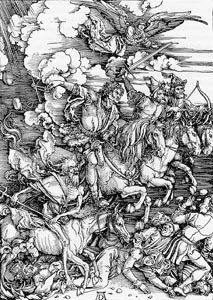Complexities of "dispensational premillennialism"
 Back in the day, I guess a whole five years ago, I took two Early Modern Europe graduate courses in the same semester. One was a straight lecture plus papers and the other a seminar but the same professor handled. The classes were not related to my focus on the South and Modern U.S. and Politics and ... I could, and briefly will, complain about much with this Professor in that she, actually the Graduate Program Boss, was not only mistaken on their value as credits toward a straight Masters in History (I could have taken some other perhaps more appropriate classes instead of these!) but also had a draconian reading load with requirements of "book notes" that took an inordinate amount of time to complete. Toward the end she was gracious enough to allow me to complete the book notes after the mini-mester ended.
Back in the day, I guess a whole five years ago, I took two Early Modern Europe graduate courses in the same semester. One was a straight lecture plus papers and the other a seminar but the same professor handled. The classes were not related to my focus on the South and Modern U.S. and Politics and ... I could, and briefly will, complain about much with this Professor in that she, actually the Graduate Program Boss, was not only mistaken on their value as credits toward a straight Masters in History (I could have taken some other perhaps more appropriate classes instead of these!) but also had a draconian reading load with requirements of "book notes" that took an inordinate amount of time to complete. Toward the end she was gracious enough to allow me to complete the book notes after the mini-mester ended.At the time I referred to this period as the "Bohanan Death March" as I was finishing up my M. Ed. comps plus teaching undergraduates that summer and taking I think two other classes and gearing up for a new teaching gig and ... I'll 'fess up that I began to resent the workload, even though I enjoyed the reading and discussions/lectures. But darned if I didn't learn tons of stuff! Those classes, especially the seminar, have remained with me. I've found the issues we covered useful for American History but also simply for wrestling with change and fear and religion and conflict and economics and technology and art and ...
The image here is from Albrecht Durer's "The Four Horsemen of the Apocalypse". I think a woodcut but I'll not bother with certainty. I thought of the image, and the "Bohanan Death March", when I noted Salon's (just watch the ad) "Apocalypse soon" by Jason Boyett. This is a reasonably easy to follow summary, with some good links, of the doctrines at play as relates to the Israel/Lebanon conflict.
I've previously posted on John Hagee and Tim LaHaye and the Rapture Ready crowd but another view of the "thinking" of this rather influential group is useful. I saw John Hagee on MSNBC recently so they are getting coverage. I'd missed this BBC article on Pastor John Hagee and his Christians United for Israel.
I find it interesting that our national media isn't as direct in questioning these types as they are across the pond. I also wonder why we get so few comparisons to fundamentalist of any stripe. Be they Muslim or Christian or ..., folks on the fringe have earned questions and concerns from the more moderate members of any advanced society. Here that might feed the Christian Right's persecution complex even more yet darned if handling their doctrines with kids gloves isn't resulting in a good dose of complex. They and their GOP allies have managed to create fears of a false "War on Christians" so perhaps we might as well confront their more bizarre ideas often resulting from inerrancy and literalism. Hem them in with their doctrines and we might see some Americans stop thinking of the GOP as "God's Own Party". Peace ... or War!




<< Home